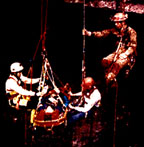Good Karma Coming:
Cave Rescue

From the very beginning, the license plate was testimony to my madness. For months I ran around in circles between Sequatchie County, where I lived, and Hamilton County, where I was on the rescue squad, trying to get that plate.

"Rescue fever," my pal Hank had called it years before, but both of us had succumbed. It could have been worse. We were learning skills that could save a life. We were helping people, and that was good. We were driving with lights flashing and sirens, and that was exciting. "It makes you feel important," my friend Skidmark told me. You want to help people, you want to be--admit it--a hero, and there's nothing wrong with that. I for one am very glad that there are folks, some of whom I'm extremely proud to call friends, who have literally dedicated their lives to helping people like me who sooner or later are bound to need it. Good Lord, who wouldn't want to be one those people?
I think of the winter night I stood in the darkness after we had brought a patient out of Grassy Cove Saltpetre Cave. The boy, who looked to be a teenager much like I was before I got connected with organized cavers, had taken a fall deep inside the cave and would have died if not for the hundred or more people, volunteers and professionals alike, who had come out to help him. I had run phone wire what seemed like a mile back into the cave, and it felt good to be a part of that rescue. It had started to snow out there in the cove, and I will never forget the sight of Lifeforce, Erlanger Hospital's helicopter, coming down through the darkness like a space ship, the snow scattering everywhere under the landing lights.
When I took off my pager and turned off my rescue radio for good, it felt like I was walking around naked at first. But the fever had broken for me, even sooner for Hank and Skid, and there was no use pretending it hadn't. I put a regular tag back on the truck. Like Torode used to say, sometimes you've got to leave some room for the next generation.
- Beth in Tree
- Fern Brouhaha
- Glider in Tree
- Natural Selection
- Nickajack Miracle
- Megawell Fatality
- Mystery Falls
- Paradox All-nighter
- Real Well Tragedy
- Stolen Well
Addendum, November 2011
As I look over these reports I am amazed that I had the audacity to publish them in the first place. Were I a member of a rescue squad today, I would almost certainly be told not to do so. Today, accounts of cave rescue are issued professionally by a trained public relations officer, and usually only after all the facts are known. I understand the need for censoring perosnal accounts (what phrase is more common today than, "I cannot comment due to ongoing litigation") but I also know that the result is that the details of modern cave rescue are rarely if ever available to the public. Would making those details available prevent injuries and save lives? Are we doing enough to ensure that simple mistakes that kill people in caves don't keep happening again and again?I hope so.
Water | Caving | Hang Gliding | Backpacking | About

Copyright © 1996-2013 by Rodger Ling.
All rights reserved.





